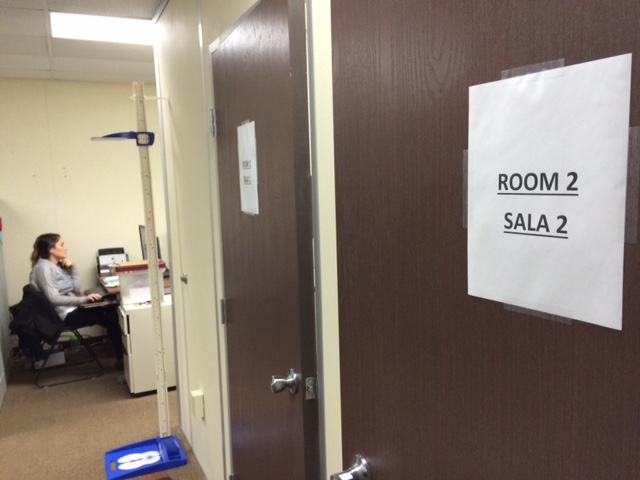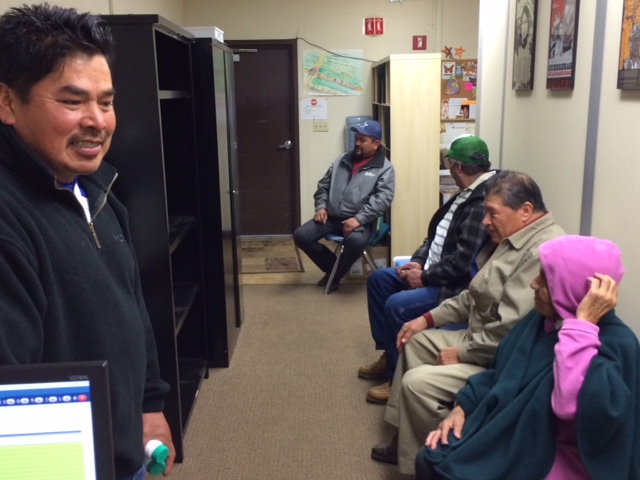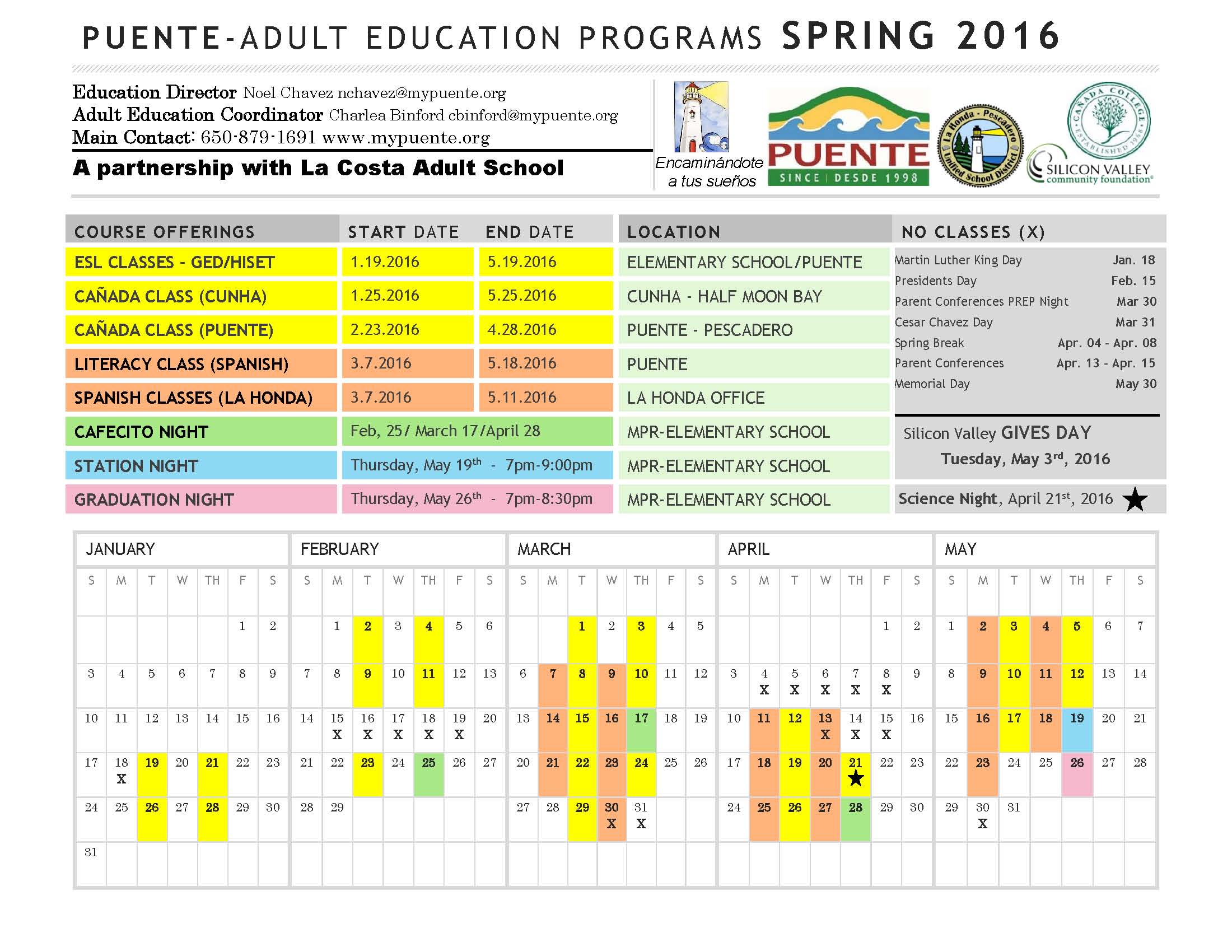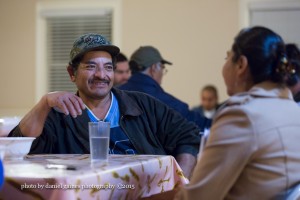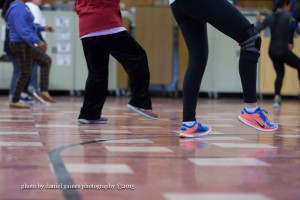Eliseo Vega knows how risky it can be to miss work, even for a day. When you’re worried about feeding yourself or your family, a day’s wage can make all the difference. That’s why he’s forced himself to work through high fevers and chronic back pain. “Sometimes I work when I am sick because if I lay down I feel worse,” he explains. (Vega’s name has been changed because he is undocumented).
But sometimes the fever lasts too long, the pain too intense to ignore. That’s when Vega and other Pescadero-area residents – mostly low-income farm workers who are only used to seeing a doctor for their urgent health problems – book an appointment at Puente’s medical clinic, a satellite of San Mateo Medical Center’s Coastside Clinic in Half Moon Bay.
Vega was one of 6 patients who came to see the doctor on a recent Thursday night at a Puente office portable, which underwent major renovations this summer to accommodate a growing demand for local first-line medical care in a region that for too long has had none. The clinic, which opened in March 2015, now has two exam rooms and a comfortable waiting area for patients. The rest of the portable is subdivided into cubicles that let Puente and county staff work side-by-side during clinic hours. The clinic was made possible with help from Supervisor Don Horsley, and funding for clinic improvements came from county grants, Measure A tax income, Kaiser Permanente, Lucile Packard Children’s Hospital Stanford, and Puente’s general fund.
“There’s just so much work that goes into turning this into a clinic at night. When it’s smooth, I’m actually kind of curious as to why, anticipating something to go wrong,” jokes Molly Wolfes, Puente Community Health Coordinator and self–described “clinic mom.”
Wolfes knows every patient by name, since she’s often the one who books their appointments and transportation to and from appoinments. During clinic hours, she interacts with patients, works the phones, and troubleshoots with drop-ins, like the man who came in to get help with his blood glucose monitor, which he didn’t know how to use.
On this Thursday night, every patient but one honored their doctor’s appointments in spite of the driving rain. An elderly woman with trouble walking, a new patient getting his first-ever physical after signing up for county health insurance through Puente, a mother suffering from headaches – they all received efficient care from the county’s professional health team, including Dr. Rebecca Ashe, a nurse, a medical assistant and an administrative patient support assistant.
Vega, a sturdy man with a grey mustache and hair plastered under a baseball cap, saw Dr. Ashe and received cold remedies and pain medication for his back. “Everyone where I live is sick right now,” he explained, describing the barracks he shares with other farm workers. “Sometimes I bring them to the doctor. I tell them, ‘We’ll go see Molly at the clinic from 5 to 7.’”
More and more patients like Vega are receiving essential medical care at the Pescadero clinic, which is regularly booked a month in advance and takes patients who have enrolled in ACE, Medi-Cal, or Medi-Care. A total of 195 patients have been seen in 2015 since the clinic opened in March, although that number does not account for the referrals to specialty care and follow-up appointments at Half Moon Bay or San Mateo Medical Center. Eighty percent of the appointments were farm workers, and the majority are men.
The whole point of the clinic is to make care available at times that are most convenient for the community, and make it close to home. “We want to make getting regular care as easy as possible and reduce barriers that would normally prevent people from going,” says Wolfes.
“The number of people we see simultaneously has increased. It’s become a bit more seamless,” she adds.
Dr. Ashe agrees. “It’s really nice having that second exam room. Rather than having to wait, I can see the patient in the next room. It really helps us to be more efficient with space. When people are discussing their health, they expect and deserve a private space for that.”
Dr. Ashe and her staff have diagnosed everything from heart murmurs to alcohol addiction. They see a lot of high blood pressure, cholesterol and diabetes. A substantial number of patients suffer from musculoskeletal issues, which is typical for people doing field labor. They do blood draws at the clinic and have the samples couriered to the San Mateo Medical Center. The results are available within 24 hours.
That’s not all. At some point, the clinic will add a pediatrician and a gynecologist to the mix, according to Dr. Ashe. “There’s a need. It will probably be one day per month.”
Beyond the clinic’s walls, Puente and the county have intensified efforts to reach as many under-served community members as possible. Puente’s community health workers have personally reached out to 588 unduplicated participants in Pescadero and la Honda, most of them at least twice, in an effort to get them enrolled in health insurance, provide them with health information, and connect them to the county health system. Puente is in the process of hiring more health workers to increase that success rate even further.
And earlier this month, the San Mateo County Homeless Outreach Team (HOT) hired a new “street medicine” nurse practitioner who will locate and treat homeless and farm workers at their homes and in the fields where they work.
“There are people who resist getting care for whatever reason. People who prefer to stay secluded. It’s hard for us all to go out as a team, but one person can enable relationships,” says Dr. Ashe.
For all the progress in the past year, Puente still feels that having a temporary health clinic inside an office portable is an interim solution at best. In the long term, Puente will advocate for the construction of a health resource center the community deserves, including primary care, dental and some community-specific specialty care—ideally reducing the need for urgent care visits and creating a regular medical home for South Coast residents.

